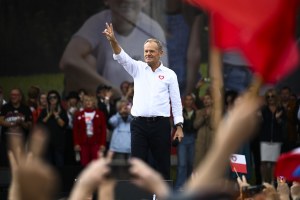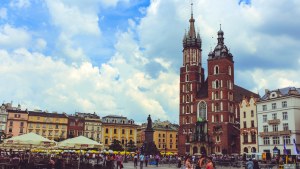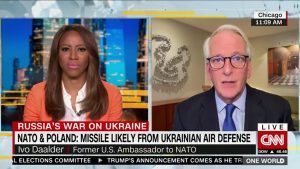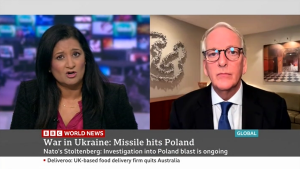Is Poland's General Election a Turning Point for the Nation?
 Play Podcast
Play Podcast
About the Episode
On Sunday, Poland’s opposition parties won a victory in the country’s general election signaling a radical change for the country. After emerging as a major EU success story, Poland’s politics shifted dramatically almost a decade ago, putting it on a nationalist path dominated by a far-right coalition. But now the country appears headed back in a pro-EU direction. Expert Monika Sus and host Lizzy Shackelford shed light on the country's shifting politics and changing role in the global landscape.
[Lizzy Shackelford: This is Deep Dish on Global Affairs — going beyond the headlines on critical global issues. I’m your host, Lizzy Shackelford, with the Chicago Council on Global Affairs.
This week, Poland’s opposition parties have won a solid victory in the country’s general election — and it signals a radical change both for Poland and in the EU. Today, we are going to journey through the twists and turns of Poland's political evolution – a place I even once called home. In 2011, as a fresh-faced US diplomat, my first post was at the US Embassy in Warsaw. Back then, Poland was the poster child of the European Union – a beacon of progress and prosperity. The country thrived on EU funding, embraced open borders that empowered its youth, and stood as a stalwart NATO ally, receiving unwavering support from the United States. But today, Poland feels like a totally different country. The landscape has shifted dramatically. The United Right coalition has been in power for eight years, leading the country down a path that starkly contrasts with its previous trajectory. Poland, once the EU darling, now finds itself at odds with the European Union. EU funds are frozen, a consequence of what the EU deems as democratic backsliding. The nation grapples with soaring inflation and the increasing costs of living. Even its dedication to Ukraine, once a cornerstone of its foreign policy, appears uncertain. So, what might this political transition mean for Poland and its place within the EU and the global community?
I am joined today by Monika Sus. Monika is a visiting professor at the Hertie School's Centre for International Security and associate professor at the Polish Academy of Sciences. And Monika says that the elections that they just had on Sunday were historic to many of the Polish people because...]
Monika Sus: The voter’s turnout was the highest in history. More than 70 percent of Poles voted, and this is something special, I would say. And the election was also historic because we were facing, democratic backsliding of the country. So, within the last eight years, the politics of Poland within Poland and also the policy towards the EU has changed dramatically. And if the law and justice of the ruling party would have taken the third term and won the elections, then probably Poland would decline even more in terms of democracy. And would have turned its back even more towards Western partners and allies.
Lizzy Shackelford: So, the Law and Justice Party, as you mentioned, they've been in power for the last eight years. What were their positions and who were their supporters? Where did they get their power from?
Monika Sus: Their positions were basically, let's say, based on Polish traditional values, as they used to call it, or as they still actually call it. So, of course, the very strong role of the Catholic Church. A very close link between the state and the Catholic church and the law and justice party also introduced several changes within the judiciary system of Poland, making it less independent, but more controlled by the ruling party. and they also, adopted a very, hostile approach towards the European Union. They haven't talked about poll exits, as some experts actually argued, but they did very much, had a very controversial, policies towards the European Union, blaming the EU for many things that happened in Poland that weren't to blame on the EU, they were also hostile towards the migrants especially migrants from the Muslim countries, as again, the Law and Justice Party used to call them, and, I would also say that the voters or people who voted for peace were mostly polls from smaller cities, families with lower income. And again, people for whom the traditional Polish values that I mentioned before, are crucial and are important, but this has changed now and the results of the elections that we had on Sunday, show that Poland is very much EU oriented. That the society wants to stay within the EU and that the Western orientation of the country is actually unquestionable.
Lizzy Shackelford: Yeah, it does seem as though they must have been the opposition parties collectively, which, law and justice still was the single party to win the most votes, right? That was how many percent?
Monika Sus: 35 percent we have the final numbers by today.
Lizzy Shackelford: Would you say it's more that they've lost some of their traditional supporters or, what does the matter turnout? How did the opposition parties pull this off?
Monika Sus: I think there are two aspects this question. So first of all, for the first time, I mentioned the high turnout so many young Poles went vote. And the young Poles are, of course, pro European. They are pro Western. And they don't want to leave the European Union. They have nothing against migrants from any countries. They want to have, rights for minorities like LGBT for example. And these people went, masses actually, to the polls and voted for the opposition parties. So, one of the three opposition parties. And I think that we cannot underestimate that, there is still big parts of Polish society who voted for peace, because as you said, peace scored the best, result, in the election as a single party, and the people are still in the country. And of course, these are people who, as I mentioned before, they value our tradition. They value Catholic church. They are scared that the opposition parties will take the social benefits from them. So, I think there is a combination of, different fears, on this part of the Polish society. And I think that we should remember that because they are still in the country, they will, remain here and they have to be taken into account by the new government because it's important that they try to, let's say, decrease the polarization within Poland because the polarization is really high and it is not easy to govern a country with such a high polarization.
Lizzy Shackelford: Let's shift and talk a little bit about the opposition that is at this stage going to try to form a coalition so that they can form a government, opposition leader, the familiar name of Donald Tusk, but it is not just his party. It's a coalition of them. Can you tell us a little about those players, the different parties and Donald Tusk?
Monika Sus: So, we are talking about three parties, or three, let's say, smaller coalitions. first of all, we have the Civic Coalition, as you rightly mentioned, the biggest of these parties, and this party is run by Donald Tusk. Donald Tusk was a Polish prime minister for many years before, he then went to Brussels and he took over the position of the president of the European Council, so one of the major institutions within the European Union. And this will have an impact on the EU policy, let's say, of this government. And so, this is the first and the biggest party. Then we have the third way, Poland 2050, as the second, biggest party within this camp. They scored surprisingly high, almost 15 percent of votes. And they are, again, a combination of, for example, and the very liberal movements within the Polish Socialist Party. And the third force in this opposition camp is the new left. So, a classical social democratic party that again very different from the previous two. So, the coalition will have to form itself within the next couple of weeks, probably a month. they will have to face some critical decisions who will take which ministry and which policy they actually trying to make together as a joint force the parliament.
Lizzy Shackelford: How hard a task does that appear? I mean, are you talking about like the US Congress trying to choose a House leader, because we can't seem to do that, but is this something that could create a roadblock to even forming a government, or is it just a matter of working out the details?
Monika Sus: I don't see it as a roadblock, simply because the stakes are too high. So, I think all the three parties actually agreed, a couple of weeks before the elections, then that if they have enough votes, they will form a coalition and out of this reason, many polls actually decided to go vote. So, I don't think it will be impossible. I think they will manage to do it within the one month that they have, but it will be complicated. And I think that, there are certain issues, of course, On which they differ a lot. Let me mention just a couple of them. So, worldviews like abortion, same sex marriages, but also the approach to social benefits retirement age. So, all the, divisive issues across many societies. They're also very present in Poland and they will have to find the middle ground and they will have to find a compromise. But again, I am convinced do it. Because it's simply too important, they cannot risk the government to be taken over minority government of the Law and Justice Party.
Lizzy Shackelford: You had mentioned that this was a historical election and, a big part of that was the really high turnout. was this election considered free and fair? was this outcome expected and are there lessons that, the pro EU elements across other countries in Europe can take from the opposition's success here?
Monika Sus: I wouldn't say that the elections were fair. They were free, yes, but they weren't fair. Simply because let's just mention state controlled media. So, the Law and Justice Party really privatized, to some extent, instrumentalized media within the last eight years. And all the public media that are still watched by many polls, of course, were absolutely trying to push for the propaganda ruling party. And it was really taken up to a limit. The same with newspapers, the same with state owned companies. So really, the whole, let's say, state apparatus was walking in favor of the ruling party. And if we take this into account, then I still, think that the results of the elections. really good for the opposition parties because despite all this, they managed to score such a high numbers. the lessons that we can learn, I would say that what really make a difference this time, from my perspective, were many non governmental organizations who are actually encouraging Poles to go and vote. So it wasn't, something like go and vote for the opposition. No, it was just go and vote. So, there are special campaigns directed to young people via Twitter, TikTok, Instagram, whatever you name it on social channels. There were also special campaigns, aimed at women, because Polish women stayed at home basically 2019 because they didn't want to go and vote for neither peace or the opposition, back then. And I think that this is really something that perhaps other countries can learn from Poland.
Lizzy Shackelford: Poland has a really strong civil society. I mean, I remember this from my time there. This is a legacy from, you know, decades of a lot of, civic activism, non governmental organizations. So, you've mentioned that there were a lot of organizations that were pushing to get out the vote. How important was that to the opposition's success? I mean, was that what pushed them over the line with the get out the vote?
Monika Sus: I absolutely think that this pushed them over the line. out of two reasons. So, first of all, women went and voted, many women, voted for the opposition also because one of the very controversial topics that, the Law and Justice Party introduced over the last couple of years, was the very strict abortion law and many Polish women. That actually weren't politically active and perhaps wouldn't otherwise go and vote. They decided to take the matter into their own hands. And, uh, there were many campaigns saying, let women decide what they're going to do with their bodies. So, I think that was one of the important reasons. And again, I mentioned already young people. and I think here, Poland is probably not very different from other European societies. Young people are Not very interested in politics, especially when they see the same faces over and over again. And this is the case for the Polish election, unfortunately, at least in many districts. So, Donald Tusk was prime minister, he was running against Jaroslaw Kaczyński, the leader of the Law and Justice Party. We saw it before, actually for the last 20 years. So, I think if it weren't for these pro vote campaigns, young people would actually stay at home and, now they went and vote and majority of them voted for the opposition parties.
Lizzy Shackelford: Poland, like a lot of countries around the world and in Europe today, has been facing, some real economic headwinds. What do you see as the economic impacts of this outcome and a change in government?
Monika Sus: They were actually polls, made together with the exit polls, were asked what were the most important topics, for them, you know, in front of the elections, and economy and high inflation was, of course, the major topic, followed by abortion, And women rights in general. So, I think that, obviously, I mean, we have high inflation in the country. I will just give you 1 example. The ruling party will and justice decided to increase the defense spending military and security oriented expenditures. And of course, to some extent, this is understandable because Poland is the front state and we have the border with Ukraine, and we are facing the Russian threat for several years by now. But on the other hand, increasing the defense spending also means decreasing the spending, for example, education, social matters. So, this is very much a topic that the new coalition will have to take up quite quickly. But I think what can help you mentioned the suspension of the funds from the European Commission. So, this is one of the first. And major points that the opposition parties already announced they will do, they will try to solve the conflict over the rule of law with the European Commission. And by that, they will also try to regain, let's say, the funds that Poland was supposed to get, over the last couple of months. And this definitely will help to solve some economic issues. But I would be cautious in expecting quick results. Let's put it this way. So, the Law and Justice Party introduced so many changes to the judicial system, that it will simply take time to get it back on track of democratic rules.
Lizzy Shackelford: Right, so they are going to have to abide by what the EU wants and that's going to take time. So, you had mentioned the anti immigration positions of the current ruling party. I guess what we would call an October surprise and us electoral parlance, popped up at the last minute, this scandal of, a lot of members of sitting government being involved in visa sales. To the very people that they are scaremongering about, coming to Poland and being dangerous. So, do you think that that played any role in, some of the law and justice supporters or in the outcome, or was that just a sideshow?
Monika Sus: This is a very good question, and I think it's really difficult to make an assessment here, because on the one hand, there were other affairs during the last eight years of the Law and Justice Party's government, and actually, there was a label, let's say, coined by some experts here in Poland that the Law, , and justice party was the Teflon party. So, like the frying pan. So basically, resistant to any possible crises and, affairs. but I think that this particular, visa offer actually damage, simply because it was so much incoherent with the policy of the law and justice. So being anti migrant, being anti migrants from the Islamic countries, and then selling visas to them. So, I think it did make a difference. I wouldn't say the difference was huge, but I think it, made some people think probably whether the policies that the Law and justice party actually praised to do are really, implemented, to some extent. So certainly, there was something to that. And of course, also many people of a more leftist liberal orientation. they also felt mobilized by this affair. so again, the high turnout could be also explained by some people just, you know, got annoyed by this affair and decided to go and vote for the opposition.
Lizzy Shackelford: Now, zooming out a little bit from Poland, this election is in a lot of ways very representative of what many other countries across Europe are seeing. It's this clash between the pro European progressive political movement and the kind of national conservative agenda. What do you think this outcome in Poland means for the bigger struggle across Europe and in individual countries. Are there countries where you think this could particularly mobilize one side or the other, or that might help bring different electoral outcomes in the coming years?
Monika Sus: The elections are important for many countries. let's start with the European Union. So, we will be facing the elections to the European Parliament in June, and of course, this, democratic turn in Poland weakens the illiberal democracies like Hungary, possibly also Slovakia, because we've been facing some changes in Slovakia towards a more, let's say, illiberal democracies as well. So, this is something that definitely weakens the anti European parts of the European voters many of the European states. So, this is one thing. Then I also I think that the election results are to some extent a manifestation that the European societies actually want to be integrated and they see the value in the European integration, especially in the face of the Russian threats, possibly also other geopolitical threats that are looming over Europe as well. So, I think this is another, manifestation of how important actually this, election, was. And then, of course, many, many experts from, countries that are on the brink, to turning into illiberal democracies actually take this, election results as a very optimistic sign that still something can be done. And even after eight years of such a strong anti liberal government who have state controlled media that we mentioned and with the state propaganda being anti EU, anti German, anti Western, and anti migrant, there is something that still societies can do, through their voters and through non governmental organizations, and also, of course, admittedly, through a smart policies of the opposition party. So, I think there is an optimism, let's say, that entered into the European discussion. And, of course, the last, aspect here, I think the European Union is now really confronted with a large number of challenges and having Poland as a strong democratic state with a strong army and with a strong alliance with the United States, of course, matters a lot for the European security.
Lizzy Shackelford: Which countries do you think, are, the biggest losers from this outcome? You know, are there countries across Europe where their governments were really hoping that Poland would continue down the national conservative path. And which countries are going to be the ones to benefit the most from Poland shifting direction?
Monika Sus: So, definitely, Viktor Orban in Hungary is not happy about the outcome. for sure. and, of course, I mean, depending how we understand Europe, but another person who is definitely not happy about the outcome is the Russian President Vladimir Putin, because, as I said, the outcome of the Polish elections. Strengthen the European Union considerably and on the happy side. Definitely. Berlin is relieved because the level of the anti German propaganda was really beyond any, consideration. and definitely the Polish German relationship is 1 of the key relationships in Europe for the bilateral relationship. This will change a lot over the next couple of months, I believe, and generally speaking, I think that the big countries of the EU, like Spain, Italy, but also France, they really waited for a change in Poland to happen in order to have an ally, on the more Eastern part of the continent that has been gaining importance due to the war in Ukraine.
Lizzy Shackelford: Poland is such an interesting case because even though this does seem like a bad outcome for, Russia and for Putin in particular, when we look at other European countries, the American perspective, we often say, oh, well, who's meddling in that? You know, did Russia have its thumb on the scale trying to meddle in the elections as it has in ours before? do you think there was any foreign meddling or engagement? Have there been any reports of that or do you think this was, really largely just the two sides in Poland, fighting it out in this election?
Monika Sus: Again, a very difficult question, so probably we'll know more in a couple of months or years or maybe even not, but I'd say that, it will be really difficult for Russia to meddle in the Polish elections simply because approach towards Russia is something that unites all the parties. So even though and Law and Justice Party, It's not anti Russian. It's also important to highlight, right? It's anti Putin and anti the imperialistic politics of the Russian Federation under the president. this is a very same position that the opposition parties have. They, of course, differ a bit in the tone, how they speak about Russia, how they also speak about the future of Russia. So, I think that, for example, the opposition parties are very well aware of the fact that Russia is there to stay so Russia won't move from the European continent to some extent. So, in the end, there will have to be some Russia policy coming from the EU, and this is also one of the Polish hopes, that Poland will be able to shape this policy when the day comes that the war is over, obviously, but I think that, approach to Russia is really united. And out of this reason, I think it would be really difficult for Russia to try model in this elections. But who knows?
Lizzy Shackelford: That's right. We might not have an answer on that for a long time, but Poland just is not a place where that would go over well. And, speaking of, that issue and Ukraine in particular, as you said, I mean, even the, current, government in Poland is still, a pretty big supporter of, Ukraine, but it. It's to a different degree, I guess. How would you describe what we're likely to see in a change towards Ukraine and towards the kind of NATO position?
Monika Sus: I think that the new government, when we have the opposition government indeed, will definitely it strengthens support for Ukraine even more. Although one has to also admit that Poland was from the very beginning, even under the government of the Law and Justice party, as you also mentioned, a very strong supporter of Ukraine, both military but also in terms of welcoming migrants and refugees from Ukraine in big numbers, and many of them stayed in Poland so have it let's say on everyday basis here, but I think what will change indeed will be a more comprehensive policy towards Ukraine. So, we saw it with the grain issue where the Polish government banned the grain import from Ukraine, which was very controversial because. I mean, how can you do it? That's a Ukraine supporter to some extent, but were some Polish interest of the Polish farmers, of course, behind that. And it was shortly before the election. So, we can, of course, make a case for the 2, but I mean, the interest are still here, but I think that the new government will put much more attention to diplomacy. And if situations like this happen, and there will be differences of interest between Poland and Ukraine, certainly in the future, especially when we'll be talking about the enlargement of the EU. Then Poland and Ukraine will be, let's say, competitors, for example, on the grain issue. but then, the parties will try to come together, sit at the table and discuss the issue and find a common solution. So, this is something that I'm certain of that the tone of the policymaking will be very different. and the part of that, I think that also because the significance of Poland will rise within the European Union because of the experience of Donald Tusk, but simply also because the conflict over the rule of law will end, then Poland can actually be a much stronger supporter of Ukraine, especially on the path towards membership. We've did this experience many years ago ourselves as Poles, and I think that we are really in a good place to kind of assist Ukraine in making the same experience in joining the European Union.
Lizzy Shackelford: So just to wrap up our conversation as we look ahead how durable do you think this shift back towards a pro European Union stance is for Poland? or do you think this is going to be a hard fought fight ahead?
Monika Sus: I think the change is durable and you can see it also because we saw the young voters. So, the young polls voting for the pro EU option, or the pro Western option and the pro liberal option in general terms. also, one has to really keep it in mind that. It very much depends on well the government will do over next 4 years. And it will be a difficult time for the government, not only because of the coalition composition that we talked about before, but also because of the gloomy president's vetoes. So, the president of Poland, Andrzej Duda, comes from the Law and Justice Party and is a local supporter of this party, and he has the right to refuse to sign laws. that will come from the parliament. So, it will be a difficult term for the opposition government. And then finally, another aspect that we also briefly touched upon is the polarization of society. So, the coalition government will really have to pay attention to people with lower income that are perhaps afraid, of many changes, concerning the traditional values that all of the church. So, this will have to be somehow balanced between the pro Western pro European orientation and these traditional Polish families that are still here. And, they have also a voice that we should, consider.
Lizzy Shackelford: Monika Sus of the Hertie School -- I want to thank you so much for being on Deep Dish to discuss the recent Polish elections and the country's shifting role in the European landscape, and you know, just to get me up to speed on what's been happening in a place I once called home. Thank you so much for being here!
Monika Sus: Thank you very much. It was a pleasure talking to you.
[Lizzy Shackelford: And thank you for tuning in to this episode of Deep Dish!
A reminder that we want to hear more from you, our listeners. So, send us an email or, better yet, a voice memo, to deepdish@globalaffairs.org -- You can suggest issues you’d like us to cover, guests you’d love to hear from, or you can just let us know how you think we’re doing.
And if you are looking for more Deep Dish in your podcast diet? Tap the “follow” button in your podcast app so you get each new episode as it’s released. If you think you know someone who would like today's episode, please "share" it with them!
As a reminder, the opinions you heard belong to the people who expressed them and not the Chicago Council on Global Affairs. This episode is produced and edited by Kyra Dahring and mixed by Frank McKearn from Aphorism Productions.
Thank you for listening. I’m Lizzy Shackelford and we’ll be back next week with another slice of Deep Dish.]




Related Content
 Global Politics
Global Politics
Find out how this Eastern European poster child for democracy backslid into autocracy, and what lessons it holds for the rest of the West.
 US Foreign Policy
US Foreign Policy
“The best way to deal with it is to give Ukraine the capacity to defend itself, rather than escalate this further,” Ivo Daalder tells Zain Asher.
 Public Opinion
Public Opinion
In countries that favor a negotiated end to the conflict, support for specific policy measures that aid Ukraine has fallen.
